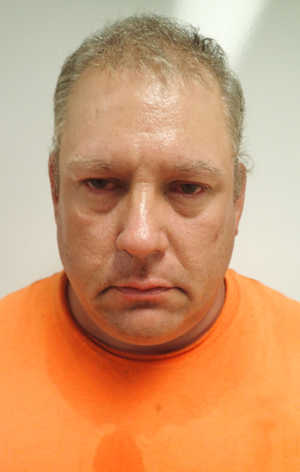
LAKEPORT, Calif. – A Clearlake man who killed a pedestrian in downtown Lower Lake in September 2016 has been sentenced to prison in a plea deal that has drawn the criticism of the victim’s father.
Robert Wade Hitchcock, 48, reached an agreement with the Lake County District Attorney’s Office in which he pleaded to driving under the influence of a methamphetamine and special allegation of causing great bodily injury or death to 40-year-old Nichole M. Welborn on Sept. 28, 2016.
Hitchcock, who had remained in the county jail since his arrest the day of the crash, will spend two years and seven months in state prison, according to Senior Deputy District Attorney Susan Krones, who prosecuted the case.
“These cases are very difficult,” said Krones, adding, “This resolution is not inconsistent with other cases that we’ve had” with similar situations.
The California Highway Patrol said that Hitchcock was driving his 1993 Ford F-150 pickup westbound on Main Street in Lower Lake at about 4:40 p.m. He veered across Main Street and hit Welborn as she was attempting to get into her vehicle, which was parked on the shoulder in front of Barreda's Lower Lake Feed Store.
Welborn was pinned between the vehicles and died at the scene, the CHP reported.
Her father, Walter Welborn, a former Lake County correctional officer who now lives in Utah, said he’s angered by the plea agreement for a variety of reasons, including his belief in its leniency and that the District Attorney’s Office did not contact him to tell him of the deal.
Krones – along with District Attorney Don Anderson – is a target of Walter Welborn’s ire over the handling of his daughter’s case. With Krones seeking the district attorney’s job and Anderson running for judge, it’s become an election year issue, with Welborn attacking both of their candidacies and outlining his displeasure in a letter to the editor.
For her part, Krones explained the case’s challenges and the reasons why it was charged as it was and why the plea agreement was offered.
She said that, originally, Hitchcock was charged with murder, several counts of vehicular manslaughter – with and without gross negligence and while intoxicated. Krones said she charged everything she thought she could prove based on the initial investigative reports.
The homicide charge was based on a 1990 misdemeanor DUI with injury conviction in Lake County on Hitchcock’s record, she said.
One of the wrinkles in keeping that homicide charge was that judges now advise everyone convicted of DUI that if they are again found driving under the influence in a case involving death, they can be charged with murder, said Krones.
That is what is known as a “Watson murder,” based on the 1981 California Supreme Court case, People v. Watson, which established that a defendant in a drunk driving case involving a fatality can be charged with, and convicted of, second-degree murder.
However, in tracking down the records for Hitchcock’s previous case, Krones said the record gave no indication Hitchcock had been given that admonition, which meant she did not have a case for murder.
Krones said the laws regarding DUI with injury are tricky, and to charge and prove gross negligence, “It requires more than just driving down the street under the influence.”

Father angry by case handling
Walter Welborn said he worked at the sheriff’s office for 21 years and has known Don Anderson for a long time.
He had moved to Utah in 2006 and had tried to get his daughter to move there as well. But she didn’t want to because of her many friends in Lake County. “She wanted to be with her friends.”
Nichole Welborn, who has a daughter who is now 21, was living in Clearlake with a job delivering medication at the time she died, her father said.
He said he had just spoken to his daughter shortly before she was killed. She had gone to her vehicle to get something and that’s when she was hit and pinned by Hitchcock’s pickup.
As there was no evidence of skidmarks, Walter Welborn thinks Hitchcock may have fallen asleep at the wheel.
He said he called Krones once to discuss the case and she told him she was “uncomfortable” with going to a jury trial for second-degree murder in the case. “I’m pretty sure she meant she couldn’t handle it,” he said.
Walter Welborn said he got no other contact from the District Attorney’s Office, but his many friends helped him keep up-to-date on the case.
Krones said it’s more difficult to prove DUI cases involving drugs. She could prove that Hitchcock had methamphetamine in his system. “It was picked up by the blood test.” However, the test did show the quantitative amount.
She said the District Attorney’s Office ultimately made an offer that Hitchcock accepted, pleading to the DUI and admitting the great bodily injury special allegation. Because of Hitchcock’s minimal prior record, it was expected he would receive the midterm of two years, which ultimately he did.
Krones acknowledged that she had talked to Walter Welborn early on in the case and added that she tries to talk to victims’ families in such circumstances. However, she acknowledged, “When it came time for the settlement conference, I did not talk to him beforehand.”
The District Attorney’s Office and the Probation Department agreed that Hitchcock’s was a midterm case due to his lack of prior record, Krones said.
Even so, “The judge struggled with it,” she said of Judge Andrew Blum, who handled the sentencing and asked her a lot of questions before making his decision.
Krones said that it’s hard to know what a jury will do in such a case. Without the plea and considering his credits, Hitchcock was looking at six years at halftime, and so would have only received six months more in custody.
With the plea agreement, Krones said Hitchcock is looking at just over two and a half years in prison still to serve, besides the nearly two years he already has spent in custody.
She said during the sentencing Nichole Welborn’s family gave victim impact statements, and they were obviously very unhappy about the outcome.
Walter Welborn was unhappy with the plea agreement and how the case was resolved, saying the District Attorney’s Office sold out the matter and Krones took the easiest way out possible. “It boils down to, they didn’t give any justice to the victims.”
Krones said she understands the family’s anger. “It’s just a horrible thing that happened.”
Email Elizabeth Larson at

 How to resolve AdBlock issue?
How to resolve AdBlock issue? 



